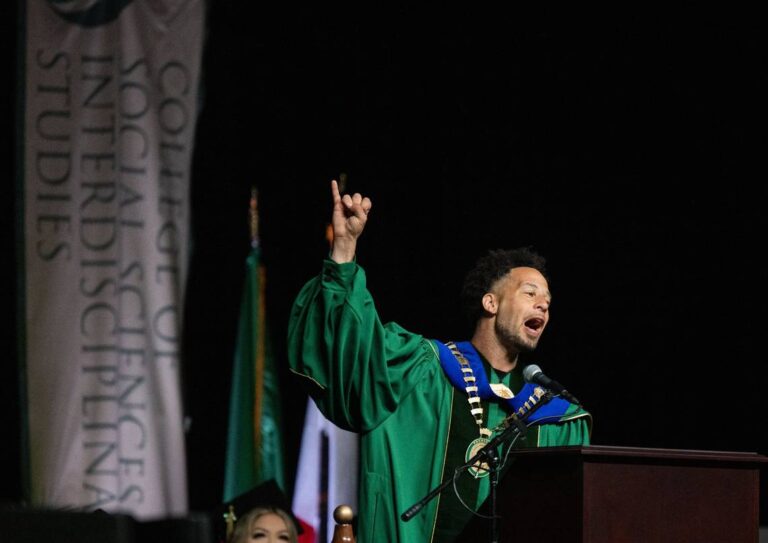When Sacramento State President Luke Wood took the stage early last weekend to send off his first class as students began their next chapter, he gave them a message about leadership.
“The world is not run by passives; it is run by those who take the leadership role, and when there is no mantle, they build their own mantle because they refuse to settle,” Wood told the crowd of thousands of graduates from the Golden 1 Center on May 20.
These are quite rich words from the president who, so far, is not leading the implementation of his new socially responsible investment policy in a public or transparent manner.
A few weeks ago, in an attempt to get pro-Palestinian protesters to stop a 10-day encampment, Sacramento State announced a policy which would prohibit “direct investments in companies and funds that profit from genocide, ethnic cleansing and activities that violate basic human rights.” But what do these words do Really nasty? Wood and his management team are keeping it quiet so far.
Notice
After weeks of reporting on the protest and its results, including a visit to the temporary encampment, it is clear to me that this policy relies on vague language. If ever implemented, it would make the university an international judge and jury when it comes to deciding which companies it does business with.
Wood is not showing leadership by avoiding the implications of what he has led the university into. The three categories of inhumanity in his investment policy are no joke. The university must now adhere to its own policy and investigate companies that invest in those committing these outrageous acts.
How will Sac State determine divestments?
The university says it has no direct investments that violate this policy and it will investigate whether “indirect” investments like mutual funds include companies that do so. How did they make this first decision?
Here are the questions I asked Sacramento State that the university has yet to answer regarding genocide, ethnic cleansing and violations of basic human rights:
▪ Genocide: What definition of genocide does the university plan to apply? More precisely, which nations and groups are committing genocide in the eyes of the university today? Is Israel or Hamas guilty of genocide?
▪ Ethnic cleansing: What is the university’s definition of ethnic cleansing? How does the university plan to identify the perpetrators of ethnic cleansing? According to the university, are any nations or groups currently committing ethnic cleansing?
▪ Violations of fundamental human rights: Please specify each human right that the university considers fundamental. How does the university plan to determine whether a nation or group is violating these basic human rights? According to the university, are nations or groups now violating these rights?
Although it provided no response, Sacramento State informed me that it would “issue guidance on the new policy in the coming weeks.”
Among these three categories, the identification of basic human rights in the world seems to be the biggest question mark. You could make a list as long as the American River of the violations of basic human rights that the United States commits on a daily basis. Will the university divest from corporate America that does not support women’s rights to make decisions about their own bodies? Will they divest from countries and organizations that indirectly invest in CoreCivic, a for-profit prison company? with a history of abuse Black and brown inmates?
Where are the CSU administrators on this?
A single university cannot solve the world’s problems, especially if it is part of a system of 23 universities. Sacramento State’s independent work in monitoring investments seems arrogant and could prove to be an insurmountable task.
Where is California State University Board of Directors In all of this? Don’t they set policy? Shouldn’t they be the ones to decide where the system’s funds can be invested?
President Wood chose a dangerous leadership test by engaging in the national debate on divestment. The toughest subjects deserve the coolest faces.
In the meantime, we are awaiting “guidelines” from the university.
If Wood and the university thought that ending the unrest would allow the university to go unnoticed, they miscalculated. Their “leadership” in terms of divestment places them squarely in the hot seat. The longer the silence lasts, the more it seems like an illusion to restore order to the student body before exams.
Talk about leadership.


